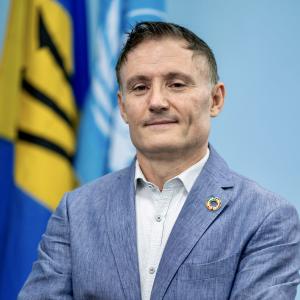ACKNOWLEDGEMENTS
- Senator the Honorable Lisa Cummins, Minister of Energy and Business Development of Barbados
- Representatives of Government
- Demilola Ogunbiyi SRSG for Sustainable Energy For All
- Development Partners,
- Colleagues and Friends,
It's my pleasure to welcome you to this National Workshop on the Energy Transition and Investment Plan for Barbados, hosted by the Ministry of Energy and Business and Sustainable Energy for All. This Workshop is on time and critical after last year’s triple crisis of energy, food and finance. It has no doubt encouraged a stronger and faster transition to cleaner, more efficient, and sustainable economies both in the region and worldwide.
I’d like to thank the hosts for this important and innovative collaboration to develop the ETIP. This Plan forms the foundation of next steps to achieve SDG 7 on ensuring access to affordable, reliable, sustainable energy, and contribute to SDG 13 on Climate Action.
Ladies and gentlemen,
Despite its challenges, Barbados has made great strides in achieving SDG 7 and other SDGs. After the 2015 Paris Agreement to limit global warming, the Barbados Government ratified its Nationally Determined Contributions with solid targets.
The Government set a goal of 95% of its electricity generation to be produced by renewable energy technology by 2030. In the energy sector, they also targeted a renewable energy technology share of 65%.
I must commend the Government on this swift and decisive action, reflecting the growing urgency to protect the economy from energy market volatility. In the long run, this will protect the fragile environment and ecosystems which are already highly vulnerable to climate-related disasters. Such commitment is transformative, even evident in the widespread use of solar water heaters islandwide.
Distinguished Guests,
Recognising the commendable efforts of the Barbados Government, it is important to highlight the long road ahead. Barbados currently relies heavily on fossil fuel imports. A large 90% of its total energy supply is oil-based and the renewable energy technology share is only 12%. The island has low fossil fuel reserves, which makes it highly exposed to fuel price volatility which affects electricity tariffs, cost recovery, and ultimately, sustainability.
This dependency has far-reaching consequences for achieving all SDGs. Rising fuel costs affect the fiscal balance, reducing available funds for much needed investments. High energy prices also increase the cost of living for communities, and impacts jobs and livelihoods especially for the most vulnerable.
The Government understands these challenges and seeks to go above and beyond by increasing its renewable energy technology share to 100% by 2030. They also aim to electrify the transport sector; increase diversity in the types of energy sources while creating jobs. All require strong legislative and regulatory frameworks.
However, achieving carbon neutrality by 2030 and net-zero emissions in the energy sector requires large amounts of committed capital.
Her Excellency, Prime Minister Mia Mottley, recently advocated for increased climate finance to support a green transition for Barbados.
The Government has taken steps to encourage this by establishing a national energy storage policy, scaling up renewable resources - up to ten megawatts. However, accessing this scarce storage technology requires high levels of investment for a sector that financial markets often see as too risky.
This high risk perception also applies to energy efficiency investments which are necessary to achieve national targets. To address this perception, we must keep exploring how to better de-risk the sector and attract private flows. I would like to stress that this can only begin with the Government, IFIs and the private sector working together as one.
To this end, the UN Barbados and Eastern Caribbean Multi-country office co-hosted the Triple Crisis Roundtable with the Caribbean Development Bank last September, to uncover solutions and policy responses for strengthening food systems and boosting the renewable energy transition.
As a follow up, we also took steps to form a coalition of development partners and IFIs with UN agencies to support the energy transition in the Eastern Caribbean. This type of coalition looks to promote multi-stakeholder engagement to develop a pipeline of investable projects, improve access to financial and private investments, and support countries to adjust their regulatory framework to better enable the latter. The private sector now needs to be strongly brought into the fold to ensure projects are market-driven and therefore sustainable. We look forward to partner with Barbados in this regard.
Government Representatives, and Development Partners,
The agenda for this two-day workshop has been carefully planned to incorporate comprehensive knowledge sharing including analyses and best practice around investments, finance and capacity-building. In this regard, I want to recommit the UN system offer in support of this crucial agenda including boosting access to green finance and technical assistance for energy transition.
I wish you a successful workshop going forward.
Thank you!




